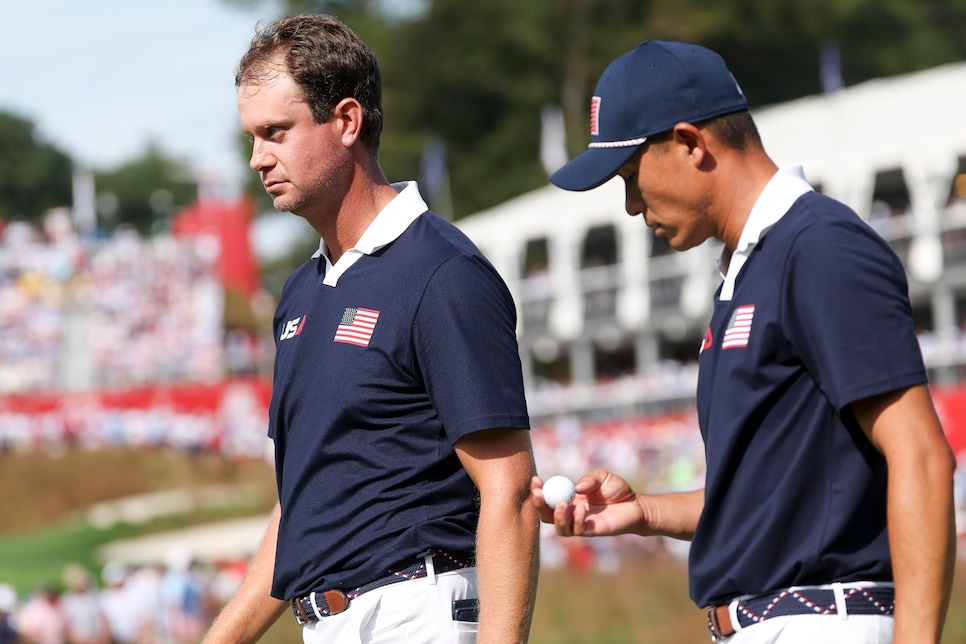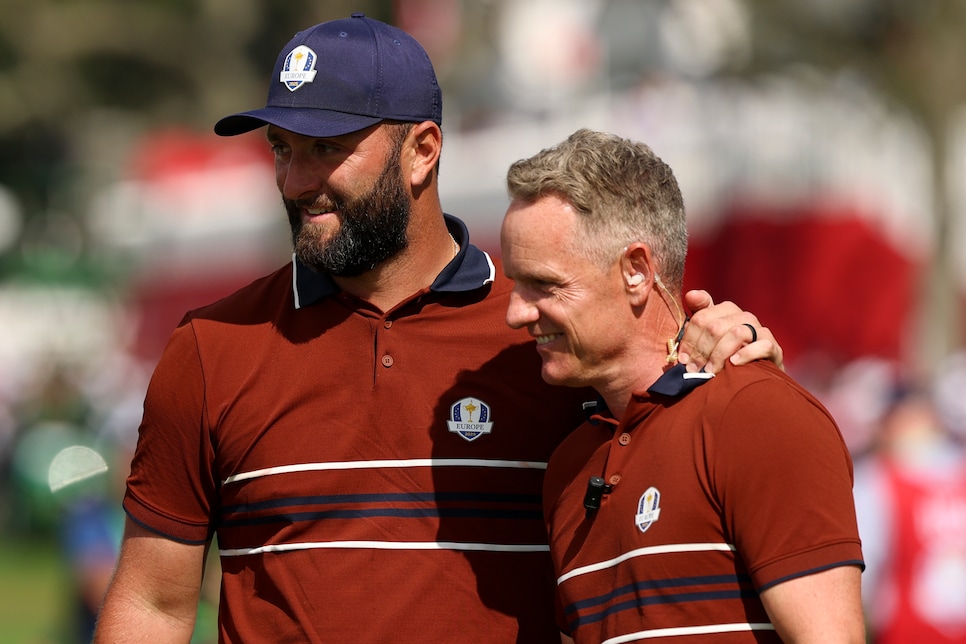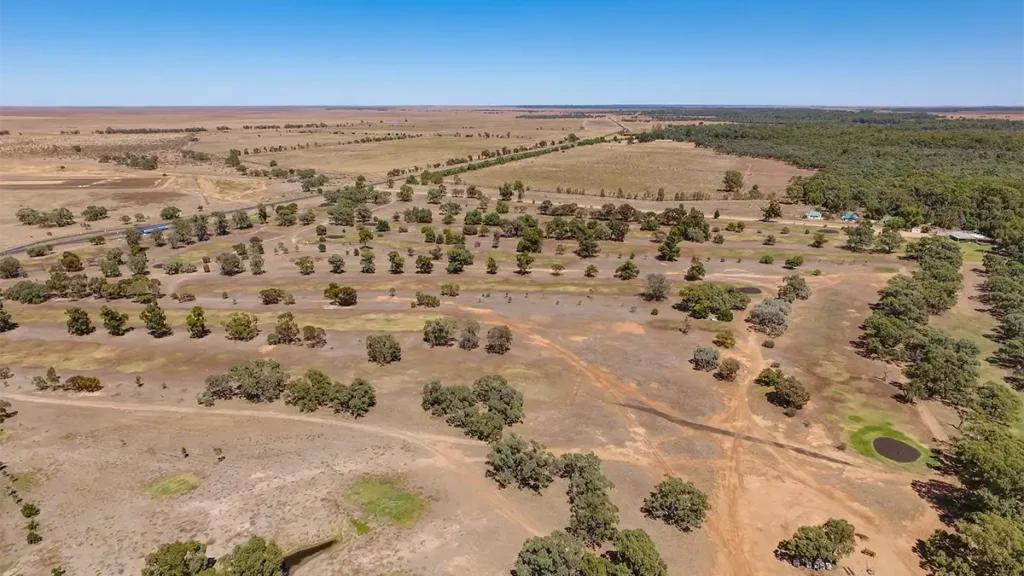[PHOTO: Jamie Squire]
After Europe’s Ryder Cup victory at Bethpage Black, there are people who will point to the strong European play on Friday and Saturday as an explanation for how the US was humbled on its own soil, ending the decade-long era of the home blowout. American captain Keegan Bradley is one of them. On Saturday night, facing the worst second-day deficit in modern Cup history, he lamented Europe’s mind-boggling putting performance. It serves his interest to push that narrative, since any focus on their play distracts from the failures of his captaincy, but he’s not wrong. Europe did play exceptionally well in tough circumstances, and Luke Donald’s team deserves a mountain of credit.
RELATED: Watch the putt that retained the trophy (and the celebration that had Shane Lowry out of breath)
Unfortunately, there is a glaring problem with relying on this explanation to the exclusion of the systems behind the performance. There is a reason Europe held a seven-point lead going into singles, just as there’s a reason that when the captains’ influence waned on Sunday, the tide reversed to such a shocking degree that it almost bailed out Keegan Bradley. (Ironically, coming up just short had the effect of accentuating his mistakes; more on that below.) It’s not because the Europeans have better players than the Americans – statistics alone can tell you as much. There is luck and variance in such a brief format, but the fact is that the Europeans built an institutional advantage that gave them an edge in the pairs sessions before the first ball was even struck. On the occasions when America has succeeded this century – just three times, in 2008, 2016 and 2021 – it’s because they successfully counteracted Europe on that institutional front, built a well-oiled organisation and came prepared to execute an informed plan.
But after the Rome blowout of 2023, instead of viewing the result as an unlucky confluence of player illness, normal road woes and a red-hot opponent – in other words, a blip in an otherwise successful US reboot beginning with the task force – they gave up the progress they had made and returned to the randomness and hope of the Ted Bishop/Tom Watson debacle. And just as in 2014, they faced a European team that, far from retreating to complacency after its spoils, stood on the shoulders of its own successful decades-long template to reach the next stage of evolution and crack the code of how to prepare a team for a road Ryder Cup.
You see the results.
Any person with any power who believes that this result can be explained exclusively by what happened on the course – “the Europeans just played/putted better” – is unconsciously perpetuating a broken ideology, and extending the time it will take to mop up an unholy mess.
• • •
In the northern summer of 2024, Bradley was selected as the next captain of the American Ryder Cup team. It had been a decade since he’d played in a Ryder Cup, he had never served as a vice-captain and there was every chance that he could qualify as a player… or, worse, he could be a borderline captain’s pick and have to decide whether to take himself. In a post debating whether this was a smart decision or not, I pointed out these red flags and further wondered how such an important decision could be made with such seeming randomness in a single phone call, based mostly on sympathy engendered from segments in “Full Swing”, and so far outside the considered philosophy they had tried to build after Gleneagles. In other words, how were we going rogue again, just a decade after the Watson debacle? I don’t consider myself especially prescient to have noticed these potential pitfalls – they were obvious. And they all came true.
Bradley seems like a smart person. He seems to have taken the job seriously, and he certainly cares deeply. He seems to be liked by his players. He made a noble sacrifice by not picking himself for the team, even though that scenario – that the only way he could fail to make the team was by being thrust into the position of captain – was an absurdity born of a sequence of poor decisions.
RELATED: A frenetic final day delivered more than seemed possible
The problem with Bradley is that he was put into a position to fail. He was not ready for this job. He could have been a tremendous captain in a decade, but with Luke Donald returning with nearly his entire team from Rome, it’s evident in hindsight that he had no chance. Even in his famous locker-room speech after last year’s Presidents Cup, when he guaranteed victory and declared that, “They’re gonna doubt me… I’ve been doubted my whole f–king life… that’s when I do my best work,” you could see him operating on the wrong theoretical principles. He thought winning the Ryder Cup was about his own will, his own energy, and not about the complex network that success requires. He was the mythical John Henry, if John Henry was unaware of the machine. Compare that to Donald’s cool, almost corporate approach, it was volatile behaviour, and you have to pity Bradley for his ignorance. Looking back, he was a determined, eager zealot, running headfirst into a brick wall.
He was put in a position to fail. In turn, once the Cup began, he put his players in a position to fail. He managed to find the statistically worst possible US foursomes pairing, put them out in the opening session, and then, when they were blown out, he committed the unthinkable blunder of sending them out again a day later, to similar results. He had teams like Henley and Scheffler teeing off on the wrong holes, which he had to correct a day later. He sat some of his best players on Friday morning because they were rookies, inadvertently putting them under even greater pressure when they had to play their first match trailing 3-1.
These may all sound like small problems, but they are tip-of-the-iceberg warnings that hint at darker trouble beneath. If you’ll tolerate an analogy, you’ve probably heard the story of big musical acts that include strange items deep in the pages of their rider – the list of requirements from the venue – with the quintessential example being something like “a glass bowl full of only yellow M&Ms”. This seems like diva behaviour on the surface, but the reality is that it’s a test of how well a venue’s staff has prepared for their show – how good is their attention to detail? If they walk in and see a glass bowl of yellow M&Ms, they can feel assured that the more important things have been properly attended to.

Harris English and Collin Morikawa lost both matches they played in foursomes. [Photo: Jamie Squire]
What we saw from Bradley was the inverse; the Collin Morikawa–Harris English pairing, or the Russell Henley–Scottie Scheffler playing order debacle, may have only cost a point or two, but it’s a point or two that decided the Cup. Like the absence of that M&M bowl, it points to a larger incompetence. It’s a bellwether of everything else that must have gone wrong, some of which we’ll learn in the coming weeks and most of which we’ll never know, from the big to the small. And it’s my belief that both great preparation and boneheaded mistakes compound and have overt and subtle influence on how things play out on the course.
There was a worrying intentionality there, too. Bradley has talented statistical analysts working for him, and unless I’m missing my mark, there’s no way they could have signed off on something like the Morikawa–English pairing or failed to notice that Henley shouldn’t be teeing off on even holes. Did he ignore them? Twice? Is there defiance here?
Stubbornness? Arrogance? How must Morikawa and English have felt, being thrown to the lions twice?
How did we so quickly return to the Watson-esque paradigm, in which one man’s idiosyncrasies have such an outsized impact on a Ryder Cup team?
• • •
And now we take a breath.
There is every temptation to overreact to this result when we extrapolate what it means for the future. I feel it acutely. When conceiving this piece, I went through mental phases where I wanted to declare that there is no chance for the US side to win at Adare Manor in 2027, that the earliest we could see a competitive result is 2029, that the Ryder Cup is fundamentally broken, that the incompetence on display at Bethpage, contrasting so emphatically with European efficiency, has ruined this thing for a generation.
But then I remembered a conversation I had with Davis Love III after Whistling Straits four years ago, when the Americans defeated the Europeans by the formerly historic margin of 19-11. Love had been one of the architects of the task force and the American rebirth and was directly responsible for the 2016 win at Hazeltine as captain, and as vice-captain five years later. When we spoke a few months later, he mentioned how they were trying to keep getting better on an organisational level. How, I wondered, was that even possible after such a massive victory? Here’s what I wrote then:
His response incorporated elements like food and transportation that were so granular they’d be too boring to recount here – at one point, it got down to what kind of water Dustin Johnson drinks – but that have a big impact on the players’ experience and will be improved in the future. Susan Martin, a manager at the PGA of America who works closely with all the captains and teams, has already sent out a questionnaire to everyone involved with the Ryder Cup to identify other areas of improvement. If they’ve come so far as managers and planners that they’re thinking in great depth about the food and the cars, it seems clear that absolutely no stone is being left unturned. And coupled with the quality of the players, it’s a disheartening prospect for their enemies; it’s America unleashed.
It’s incredible to read how optimistic that sounds, to remember how competent the Love and Steve Stricker captaincies were, and to remind ourselves that it wasn’t that long ago. At that point, the Americans had responded brilliantly to the European dominance of the early aughts by learning from their opponents, building on the lessons of Azinger’s revolutionary captaincy in ’08, forming a task force that identified the key problems and solutions of their failures, and creating a system that could function as the bedrock of successful teams.

Jon Rahm and captain Luke Donald celebrate the win of a match. [Photo: Scott Taetsch/PGA of America]
Europe, to its credit, responded in kind. With an assist from LIV Golf decimating a generation of players (many of whom I’m convinced would have been awful captains), they landed on a brilliant captain in Donald and made the smart move to keep him on board after Rome. This is their reward.
But America as a Ryder Cup power is not dead. They had found the answer – more accurately, they had found the path – but they wandered off when they responded to a setback abroad by abandoning what they’d built. They courted disaster this cycle by naming a green captain and giving him too much power too soon, and disaster, ever dutiful, answered the call. Now they live in the days of humiliation.
And yet, America doesn’t have to be a beaten dog. The answer is right there, in the recent past, and the men who can bear that message forward are ambassadors like Love, Stricker and Jim Furyk, and the next generation who served as vice-captains this year and endured the failure. There is no dearth of talent in the US – it’s still the greatest golfing power on the planet – but the lesson of Bethpage is that a team sport like the Ryder Cup requires a coherent system, and not the vicissitudes of a lone operator. Bradley, unmoored, was destined to fail. Those who come next are not bound to the same fate.







